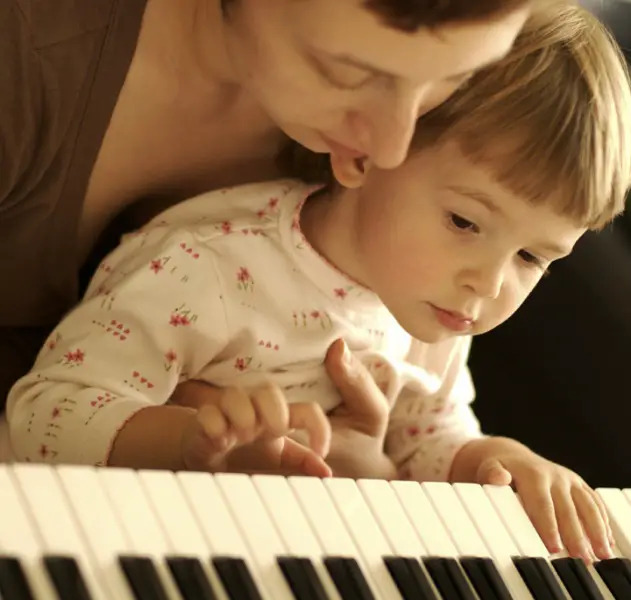Kenneth K. Guilmartin, founder and director of Music Together, knows how important music is to the development of young children, from language and concentration skills to social skills and self-esteem. Parents can contribute to their child’s music development, without being maestros, by modeling movement and singing.
 Most parents now understand the value of music for the development of young children. It is not only fun for their kids to listen, sing, and dance along to, it also helps children develop a host of important skills, such as language, concentration, social skills, confidence, and self-esteem.
Most parents now understand the value of music for the development of young children. It is not only fun for their kids to listen, sing, and dance along to, it also helps children develop a host of important skills, such as language, concentration, social skills, confidence, and self-esteem.
All children are naturally musical. Just as they are born with the potential to learn to speak and understand language, they have the ability from birth to learn music. Nurturing this innate talent early provides the foundation for later success with traditional music or dance lessons.
Unfortunately, many adults feel inadequate as music-makers themselves and, as a result, fail to make music with their children in everyday life. Parents and caregivers can contribute enormously to the enrichment of their child’s music development regardless of parents’ own music abilities. It is not important that you sing or move well; it is important that you model singing and moving for your child.
Here are some tips to help you begin your child’s musical journey:
Simply sing and dance with your child.
The best thing you can do to help set your child on the road to a lifelong love of music is to participate enthusiastically in music activities yourself. Have you ever noticed how instinctively children try to imitate older siblings and grownups? Imitation is an important part of how they learn. Children learn to talk this way, as well as to walk. If you read books, they’ll want to read. If you sing and dance, they will, too. Don’t just put on a CD. Sing, bang a drum, get up and dance. Your notes do not have to be perfect, and you may miss some words or some steps. It is about showing your child that you enjoy the music you are making.
Sing a lullaby to your child before bed.
Young children love to hear their grownups sing to them. The sound of your voice, even if it is not pitch-perfect, is precious to your child. A lullaby provides a time to be close to your child physically, emotionally, and musically. The lullaby can transform the bedtime hour into an oasis of loving calm. For babies and toddlers, it provides a comforting bedtime ritual. For older children, who are increasingly verbal, it is often the time they spontaneously confide their hopes and fears.
Take cues from your child and respond musically.
If your baby or toddler “coos” on a pitch, return the sound. If your child sings in the car or when you are out walking, sing with her. If your child brings an instrument to you, try to stop what you are doing and play along.
Make it a family affair.
Make music as a family. Have a dance party or a sing-along. Get out pots and pans and form a band. Gather around the piano. Imagine sitting around as a family and singing instead of watching TV or playing computer games. As technology increases, the importance of non-technical group interaction also increases, especially at home. Family music-making can be a wonderful activity shared by siblings, parents, grandparents, and other members of the extended family, including nannies and babysitters.
Bring your child to an early childhood music program.
Young children learn best in a nonformal environment free from performance pressure and undue interference with their natural sense of fun. A good class provides children with all the ingredients for music learning. It offers them a rich musical repertoire to actively explore, along with the pleasure and support of being with loved ones in a music-making community. A music class is a fun activity that the whole family can participate in. And attending class might just bring out your inner musician as well as your child’s.
All children can achieve basic music competence—which we define as the ability to sing in tune and move with accurate rhythm—provided their early environment supports such learning. It starts with parents’ and caregivers’ active and joyful participation, which is essential to a child’s musical growth. The next time your child is humming the theme to her favorite cartoon and rocking to the beat, make sure you join in and make some music together.



















